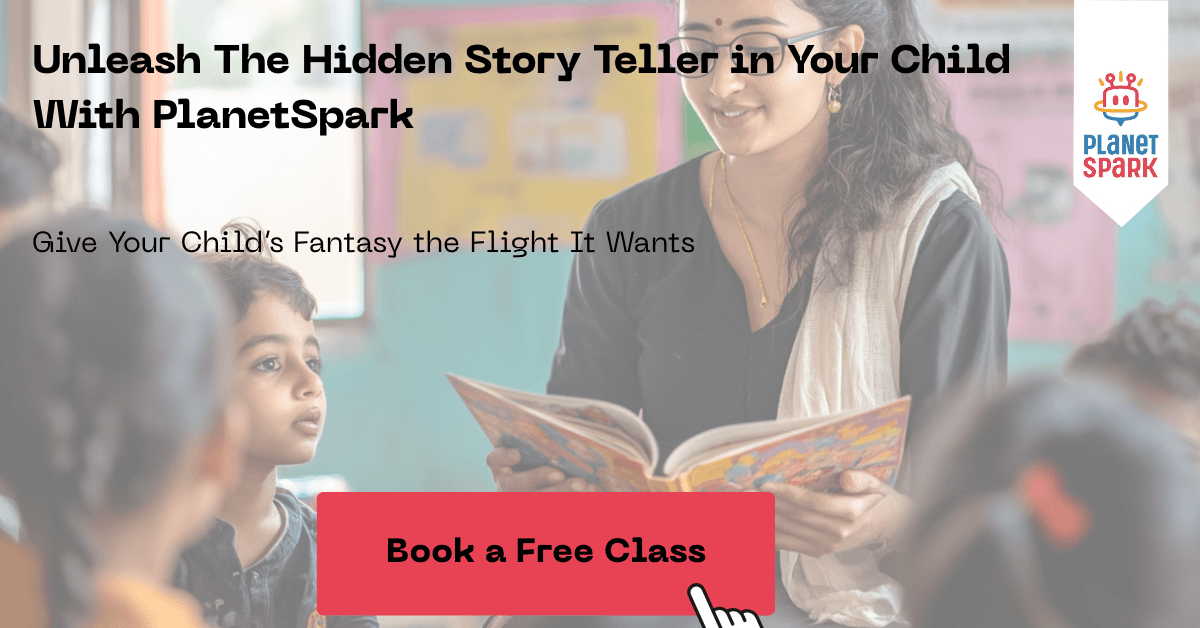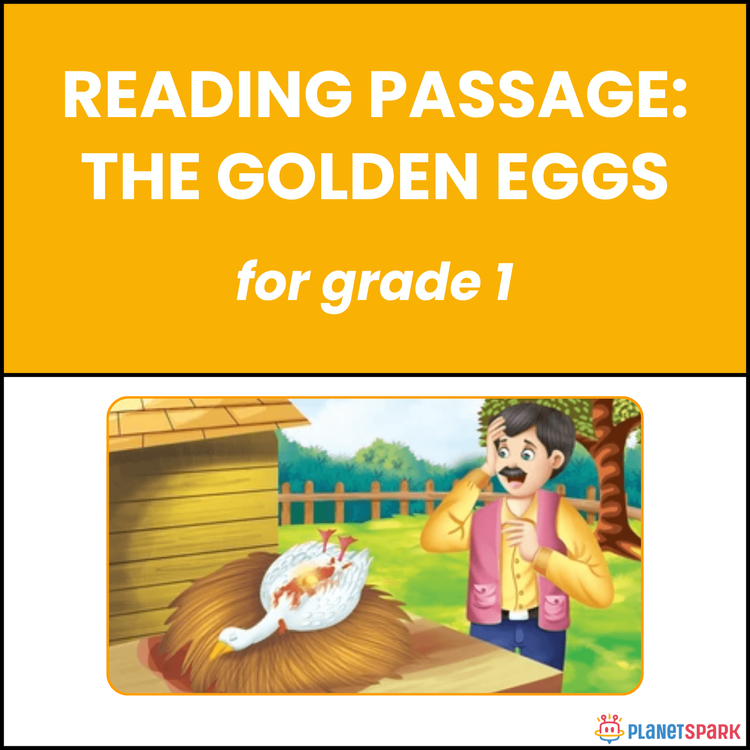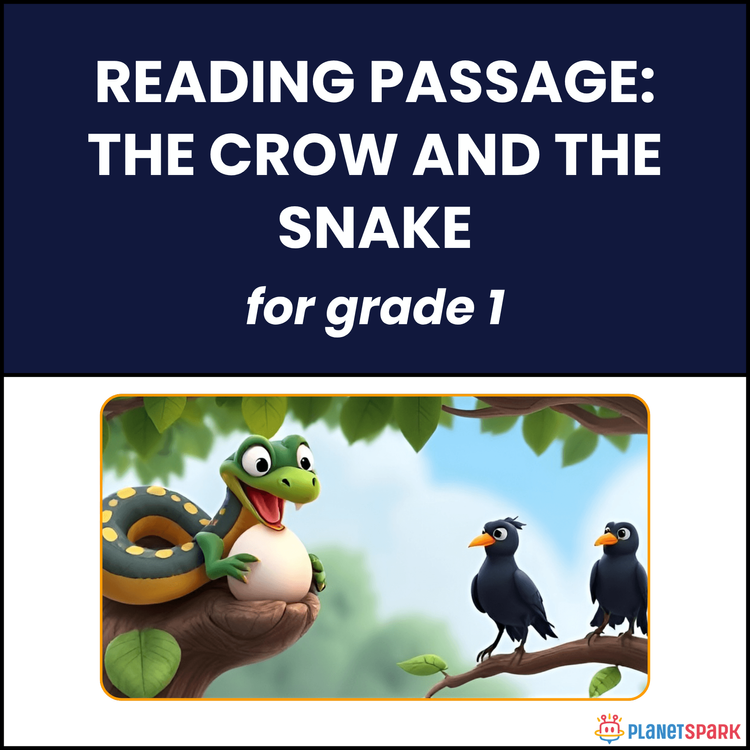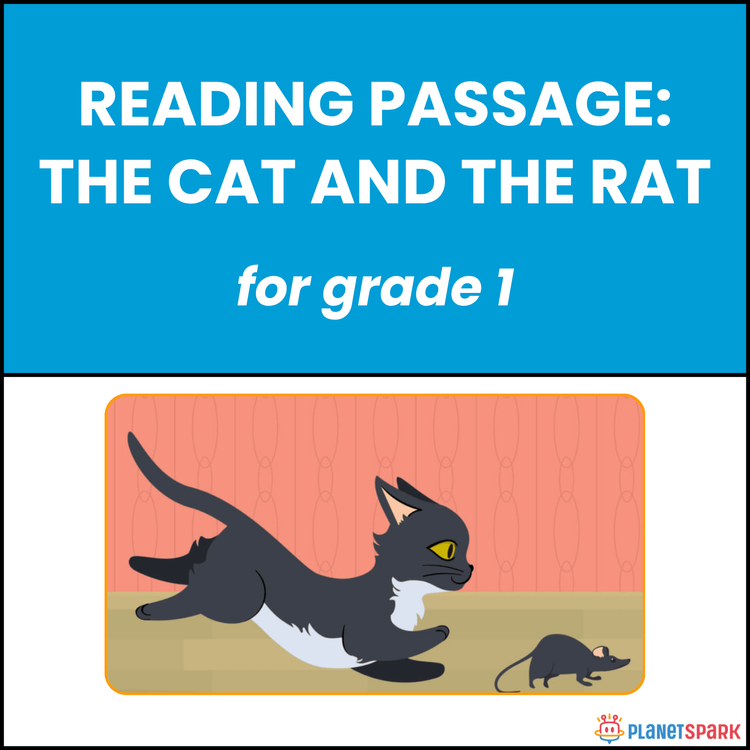Easy Small Story in English for Kids | PlanetSpark

Stories are the foundation of a child’s emotional, creative, and linguistic development. From their first bedtime tale to the stories they narrate in class, children grow up learning through the magic of storytelling. These stories shape how they understand the world, express themselves, and connect with others. For young learners, especially those new to English, easy, small stories in English serve as the perfect learning tool. These short narratives help children relate better to content, absorb vocabulary in context, and grasp the rhythm of English speech. The simplicity of such stories makes them ideal for early-stage language development, allowing children to decode words, infer meanings, and internalize grammar structures without stress or overwhelm.
Moreover, these easy, small stories are often rooted in familiar settings, animals, family, school, or nature, which increases engagement and retention. As kids listen to or read these stories repeatedly, they not only gain fluency but also the ability to infer, question, and predict, which are crucial comprehension skills. These short, simple stories are more than just fun. They nurture imagination, teach morals, build vocabulary, and develop strong communication skills. In this comprehensive blog, we’ll share what defines a small and easy English story, give examples, explain how to use them effectively, and introduce PlanetSpark's tailored learning platform that brings these stories to life for your child.
What is an Easy Small Story in English?
An easy small story in English is a short narrative that uses basic vocabulary, simple grammar structures, and relatable characters or scenarios. These stories are ideal for children and beginners, offering digestible language that can be read, spoken, and understood without difficulty.
Want to see how your child can benefit from these stories? Try a free trial session with PlanetSpark to experience storytelling-based learning in action.
Characteristics of an Easy Small Story:
- Simple Vocabulary: Uses age-appropriate words and phrases.
- Short Sentences: No complex grammar or long descriptions.
- Relatable Characters: Often animals, children, or everyday people.
- Clear Moral or Message: Teaches values like honesty, kindness, or hard work.
- Short Length: Usually under 300 words, making them ideal for quick practice.
These stories make English approachable and help children build fluency naturally.

Top 20 Easy Small Stories in English with Moral Lessons
Let’s explore classic, easy, small stories that your child can read, understand, and retell.
1. The Greedy Dog
A hungry dog once found a juicy bone. While crossing a bridge with it, he saw his reflection in the water and thought it was another dog with a bigger bone. He barked to snatch the other bone, but his own fell into the river.
Moral: Don’t be greedy.
2. The Lion and the Mouse
A lion once caught a tiny mouse. The mouse pleaded for his life and promised to help the lion one day. Amused, the lion let him go. Later, the lion was caught in a hunter’s net. The mouse came and gnawed the ropes, setting him free.
Moral: Kindness is never wasted.
3. The Thirsty Crow
On a hot day, a crow was very thirsty. He found a pot with little water. He dropped small pebbles one by one into the pot. Slowly, the water rose, and he was able to drink.
Moral: Where there is a will, there is a way.
4. The Ant and the Grasshopper
The ant worked hard all summer, collecting food. The grasshopper danced and sang. When winter came, the ant had food to eat, but the grasshopper had none.
Moral: Work today for a better tomorrow.
5. The Fox and the Grapes
A hungry fox tried to reach a bunch of grapes hanging from a vine. After several failed attempts, he gave up, saying, "The grapes are probably sour."
Moral: It’s easy to hate what you can’t have.
6. The Two Friends and the Bear
Two friends were walking through a forest. Suddenly, a bear appeared. One friend quickly climbed a tree. The other lay on the ground, pretending to be dead. The bear sniffed him and left. The friend in the tree came down and asked, "What did the bear whisper?" The other replied, "He said never trust a friend who leaves you in danger."
Moral: A friend in need is a friend indeed.
7. The Milkmaid and Her Pail
A milkmaid was carrying a pail of milk on her head. She began to dream, “I’ll make butter, sell it, buy hens, and soon be rich!” While dreaming, she tripped and spilled the milk. All her dreams were gone in an instant.
Moral: Don’t count your chickens before they hatch.
8. The Bundle of Sticks
A father gave each of his sons a stick and asked them to break it, they did so easily. Then he gave them a bundle of sticks and asked the same. They couldn’t break it.
Moral: Unity is strength.
9. The Dog in the Manger
A dog lay in a manger full of hay. Though he couldn’t eat it, he snarled and barked at the ox who tried to eat.
Moral: Don’t grudge others what you can’t enjoy yourself.
10. The Crow and the Swan
A crow admired the swan’s white feathers and tried to live in water like the swan. But he couldn’t find food and almost died. Realizing his mistake, he flew back home.
Moral: Be yourself and don’t imitate others blindly.
11. The Honest Woodcutter
A poor woodcutter dropped his axe into the river. An angel appeared and offered him a golden axe. The woodcutter refused, saying it wasn’t his. She then offered a silver axe, and again he refused. Finally, she returned his axe and rewarded his honesty with all three.
Moral: Honesty is the best policy.
12. The Boy Who Cried Wolf
A shepherd boy would cry "Wolf!" just to amuse himself. Villagers rushed to help, only to find no wolf. When a real wolf came, nobody believed his cries.
Moral: Liars are not believed even when they tell the truth.
13. The Golden Egg
A farmer had a goose that laid a golden egg every day. Greedy for more, he killed the goose to get all the eggs at once. But there were no eggs inside.
Moral: Greed destroys what you already have.
14. The Clever Rabbit
A lion was eating all the animals. One day, a clever rabbit arrived late and told the lion that another lion claimed to be king. He led the lion to a well and showed him his reflection. The lion jumped in to attack, thinking it was the other lion, and drowned.
Moral: Intelligence is stronger than strength.
15. The Cap Seller and the Monkeys
A cap seller was sleeping under a tree. Monkeys took his caps and wore them. The cap seller threw his cap on the ground. The monkeys copied him, and he collected all his caps back.
Moral: Use your wit to solve problems.
16. The Bear and the Bees
A bear came across a beehive and swatted at it for honey. The angry bees chased and stung him. He ran away, learning not to provoke trouble over a little gain.
Moral: Don’t create trouble for small rewards.
17. The Tortoise and the Ducks
A tortoise was bored with his slow life and wanted to fly. Two ducks agreed to carry him by holding a stick, while the tortoise bit it in the middle. But he opened his mouth to talk and fell.
Moral: Keep quiet when needed.
18. The Foolish Goat
A goat saw a fox trapped in a well and jumped in, thinking there was water. The fox climbed out on the goat’s back, leaving the goat stuck.
Moral: Don’t act without thinking.
19. The Farmer and the Snake
A farmer found a snake dying of cold. He took it home and warmed it. The snake bit him. As he died, the farmer realized his mistake.
Moral: Be cautious of those who can’t change their nature.
20. The Wolf and the Lamb
A wolf wanted to eat a lamb and accused it of various wrongs. Though innocent, the lamb was still eaten.
Moral: The strong may act unfairly toward the weak. A crow admired the swan’s white feathers and tried to live in water like the swan. But he couldn’t find food and almost died. Realizing his mistake, he flew back home.
Moral: Be yourself and don’t imitate others blindly.
Why Should Kids Read Easy Small Stories?
- Small English stories are essential tools for foundational language learning that enhance multiple aspects of child development. They present language in a form that is both approachable and enjoyable, helping children associate English with fun and imagination.
- These stories help children remember vocabulary more effectively and feel more confident using new words. The presence of engaging characters and clear plots makes learning seamless.
- Such stories also support emotional development, allowing children to relate to characters, understand different perspectives, and safely explore emotions.
- They promote higher-order thinking by encouraging children to ask questions, make predictions, and summarize what they’ve read.
- Parents and educators can use these stories to develop strong reading habits, critical thinking skills, and even ethical values, all while enhancing the child’s English fluency.
Curious how short stories can build strong communication skills? Enroll your child in a free PlanetSpark trial session and watch them fall in love with English learning.
Key Benefits:
- Builds Vocabulary: Children learn new words in context.
- Improves Grammar: Understanding sentence structures becomes easier.
- Encourages Speaking: Retelling the story boosts fluency and confidence.
- Enhances Comprehension: Kids learn to grasp the meaning behind words.
- Boosts Creativity: Encourages children to imagine and expand stories.
- Supports Emotional Intelligence: Helps kids relate to characters and situations.
- Develops Listening and Recall Skills: Through repeated exposure and storytelling.
When a child reads or narrates a short story, they are not just learning English, they are learning to think, express, and create in English.

How Parents and Teachers Can Use These Stories
Reading easy English stories becomes significantly more impactful when supported with fun, interactive activities at home and in the classroom. Parents and teachers play a vital role in turning simple storytime into a dynamic learning experience that strengthens vocabulary, speaking confidence, and comprehension. Here are practical ways to get involved:
At Home:
- Read Together: Make reading a shared ritual, such as bedtime storytelling.
- Ask Questions: Discuss the story's characters, events, and lessons. "Why did the fox give up? What did the rabbit do differently?"
- Story Expansion: Let your child imagine different endings or new characters to add to the tale.
- Retelling Challenge: Ask your child to narrate the story to another family member in their own words.
In Class:
- Role-Play: Act out scenes from the story using voice modulation and expressions.
- Group Discussion: Encourage students to express their thoughts on the moral of the story and whether they agree with it.
- Creative Writing: Assign students to write a sequel or a modern version of the story.
- Peer Reading: Have children read aloud to each other in small groups to boost fluency and listening skills.
These approaches transform passive reading into active, joyful learning, helping children absorb English in an immersive and memorable way.
Ready to make storytelling a daily learning ritual? Sign up for a free trial class at PlanetSpark and explore how we use stories to teach effectively.
Storytelling Tips for Kids
Helping your child tell a story is one of the best ways to build their public speaking and communication skills. It strengthens their imagination, builds vocabulary, and teaches them how to connect with an audience. Here are some storytelling tips you can use to help your child shine:
- Start with a Strong Opening: Grab attention with classic phrases like "Once upon a time..." or begin with a dramatic question.
- Use Expressions: Encourage your child to smile, frown, raise their eyebrows, or mimic actions to make their storytelling lively.
- Practice Voice Modulation: Show them how to use a loud voice for a lion, a soft voice for a mouse, or an excited tone for surprise. Voice adds personality to the story.
- Speak Clearly and Slowly: Teach them to pace their words. It’s better to speak slowly and be understood than to rush.
- End with a Moral: Help them end the story with a valuable lesson or ask the audience what they learned.
- Use Props or Drawings: Let them bring a toy or a drawing to represent a character. This makes storytelling visual and engaging.
- Practice Regularly: Make storytelling part of weekly activities. Record their stories and watch them together to track progress.
- Encourage Creativity: Let them create their own stories using familiar characters or situations. This boosts originality and excitement.
The more your child practices storytelling, the more confident, creative, and articulate they become. With the right support and techniques, every child can become a storyteller who inspires and entertains.
Want to help your child become a confident storyteller? Book a free trial class with PlanetSpark and let our expert trainers guide the way.
PlanetSpark and Easy Small Story in English: A Perfect Match
At PlanetSpark, we understand the power of storytelling in language learning. That’s why we’ve designed a program that combines expert instruction with engaging stories, tools, and technology to give your child a superior learning experience.
1. 1:1 Personal Trainers for Every Child
Every child at PlanetSpark is matched with a certified communication trainer who:
- Understands the child's personality and learning style
- Delivers fully personalized live sessions
- Provides real-time feedback
- Focuses on fluency, storytelling, public speaking, grammar, and creative writing
This personal attention accelerates learning and keeps children motivated.
2. Personalized Curriculum and Learning Roadmap
We begin with a detailed assessment and create a custom roadmap that:
- Targets grammar, vocabulary, fluency, and confidence gaps
- Follows a structured path from storytelling to public speaking
- Evolves with every milestone and trainer feedback
Your child is never stuck. The learning plan moves as they grow.
3. SparkX – AI-Enabled Video Analysis Tool
Children record stories or speeches. SparkX uses AI to analyze:
- Voice clarity and modulation
- Body language and posture
- Grammar and structure
- Confidence and flow
You get detailed reports to track measurable growth.
4. AI-Led Practice Sessions
Using our virtual AI coach, kids can:
- Practise storytelling and speech delivery
- Get instant feedback on fluency, grammar, and voice
- Reinforce skills outside live classes
This tech-backed support builds consistency.
5. Spark Diary – Writing Made Fun
Our integrated writing journal helps children:
- Reflect and write creatively every day
- Respond to prompts and structure their thoughts
- Build the habit of writing confidently
6. Gamified Learning for Daily Practice
Learning becomes fun with:
- Grammar Guru and Word Wisdom
- Antonyms Quiz and Spell Knockout
- Daily revision through fresh quizzes
Children return daily because learning feels like play.
7. Structured Parent-Teacher Meetings (PTMs)
We ensure you’re always informed with regular PTMs that:
- Share performance data
- Discuss growth and challenges
- Align on future goals
8. Comprehensive Progress Reports
You receive detailed evaluations on:
- Content originality and grammar
- Delivery and stage presence
- Organisation and structure
Every report includes custom trainer recommendations.
9. Exclusive Learning Clubs and Communities
Our clubs let children go beyond the classroom:
- Debate Club, Story Writing Club, Comedy Club
- Podcasting and Poetry Circles
Learning becomes social, collaborative, and real-world focused.
10. Sparkline – A Safe Social Space
Children share:
- Story videos and speeches
- Creative writing and reflections
- Engage with peers in a secure, moderated space
It boosts confidence and digital expression.
11. Contests and Real-Time Recognition
Children participate in:
- Storytelling and writing contests
- Open mic sessions and podcast showcases
They earn certificates, badges, and applause that build pride.
12. SparkBee – Daily Language Practice
Interactive grammar and vocabulary games ensure your child:
- Revises every day
- Strengthens fundamentals
- Competes and earns rewards
13. SparkShop – Learning Beyond Class
SparkShop offers:
- Ebooks on grammar, reading, and writing
- Interactive resources tailored to each class
- Affordable, fun learning tools at your child’s fingertips
Easy, small stories in English are central to our storytelling-based curriculum. Whether your child is reading them, retelling them, or performing them on camera, PlanetSpark ensures they learn most effectively and excitingly, possibly.
Explore how PlanetSpark turns simple stories into powerful learning experiences. Start with a free trial session tailored for your child.
Conclusion
Small English stories may seem simple, but they hold enormous power. They teach values, build fluency, and nurture a love for language. When paired with structured learning and expert guidance, these stories become stepping stones to confident communication.
PlanetSpark takes this philosophy and builds an entire ecosystem around it, one where every child can speak, write, and think in English with ease.
So if you're looking for the best way to introduce your child to the magic of storytelling and public speaking, PlanetSpark's "easy small story in English" modules are the perfect place to begin.
Start your child’s journey into English storytelling today. Book a free trial session with PlanetSpark and experience the transformation firsthand.
FAQs
Q1. What is an easy small story in English?
It is a short, simple story using basic vocabulary and structure, ideal for kids and English beginners.
Q2. What age group are these stories suitable for?
They are suitable for children aged 4 to 12, depending on the story complexity.
Q3. Can these stories improve my child’s speaking skills?
Yes. Retelling and performing these stories boosts fluency and confidence in speaking.
Q4. Does PlanetSpark include such stories in its curriculum?
Absolutely. Our courses use easy stories to teach grammar, writing, and public speaking.
Q5. Are there activities beyond reading the stories?
Yes. Kids write, speak, record, and receive feedback on these stories through tools like SparkX and Spark Diary.
Q6. Can my child learn through games and videos, too?
Yes. We use gamified quizzes, AI-based analysis, and digital journaling for a well-rounded experience.
Q7. How can I enroll my child in PlanetSpark’s Storytelling and Communication Course?
You can sign up for a free trial class where your child can experience storytelling, writing, and public speaking under expert guidance.
Download Free Worksheets
Personalized Communication Report
Record a video to get a AI generated personalized communication report for your child

Hi There, want to try these
tips for your child with
LIVE with our expert coach?
Let's check your child's
English fluency



